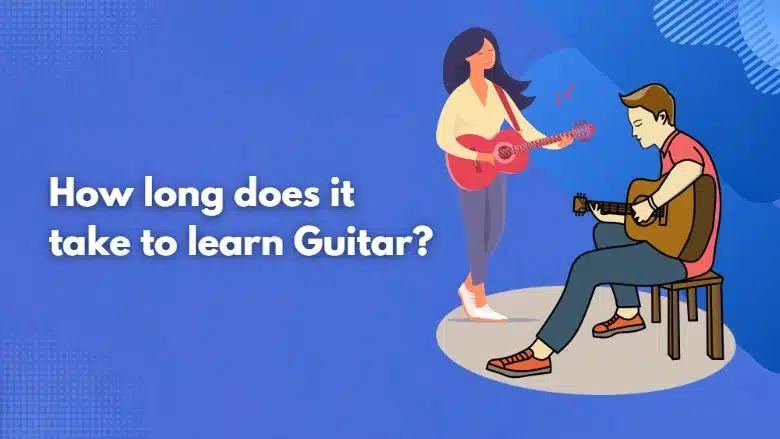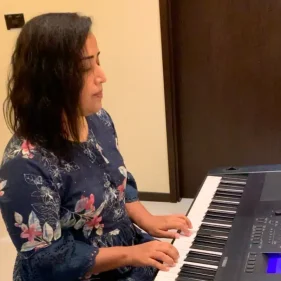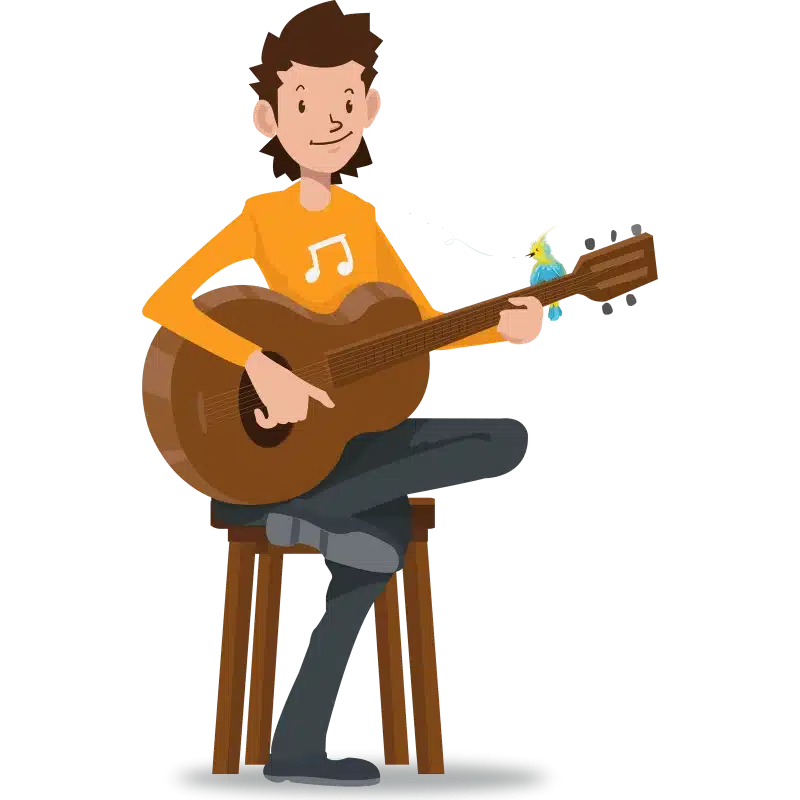- How long does it take to learn guitar basics (basic chords and strumming patterns)
- What are some tips for learning the guitar faster?
- How long does it take to be able to play guitar by yourself?
- How long does it take to be able to play guitar with a professional guitar coach?
- How long does it take to learn guitar for a beginner daily so that you continue to improve over time?
- How does the quantity of practice you put into learning the guitar affect the learning process?
- What are the essential skills required to start learning guitar?
- Conclusion
- FAQs
Guitar is a popular musical instrument that can be played solo or in a band. Are you interested in learning how to play guitar? Whether you want to be the next Jimi Hendrix or want to strum along to your favourite songs, learning guitar can be a fun and rewarding experience. If you’re thinking about learning to play guitar, you might be wondering how long it will take to get good at it.
How long does it take to learn guitar? How much work is involved? What progress can I expect in the first few weeks/months/years? Can I know it by myself by watching online resources? Do I need to approach a professional guitar coach to become an expert in playing guitar? These are common questions that people have about learning guitar. How long it takes to learn guitar depends on several factors, such as how often you practice, how much natural talent you have, what type of guitar you’re playing, and the learning method you are choosing.
If you’re starting, expect to spend several months learning the basics before moving on to more advanced techniques. If you have a lot of natural talent and practice regularly, you could learn the basics within a few months. However, it takes years to master the instrument and become a great player. Even if you never achieve perfection, playing guitar can be a fun and rewarding experience. So don’t be discouraged – start practicing today! You might be surprised at how quickly you make progress.
In this article, we will answer all of those questions and more. We will also discuss different methods for learning guitar and give you some advice on getting started. So whether you’re a complete beginner or an experienced player who wants to pick up a new skill, read on!
How long does it take to learn guitar basics (basic chords and strumming patterns)
Generally speaking, it takes several months to learn the basics of guitar playing, such as chords and strumming patterns. Chords are one of the most important aspects of guitar playing. A chord is simply two or more notes played together. There are many different chords, and each one has a different sound. Chords can be played solo or in a band setting. Strumming patterns are also essential to learn. A strumming design is how you strum the strings on the guitar. There are many different strumming patterns, and each one gives the music a different feel.
General timeline to learn guitar basics from the first month to 2 years
In the first month of learning guitar, you should expect to spend most of your time getting comfortable with the instrument. This means learning how to hold the guitar, tune the strings, and make basic chords. You will also start to learn some simple strumming patterns.
In the second month, you will continue to learn new chords and strumming patterns. You will also begin to learn some essential songs. In the third month, you will continue to improve your skills by learning more chords, strumming patterns, and songs. By the end of three months, you should be able to play a few simple pieces.
As you continue practicing for three months, you will slowly improve your skills. You will be able to play more challenging tunes after six months. You should be able to play the majority of songs after a year. After two years, you will be an accomplished guitarist.
Of course, this is just a general timeline. How quickly you learn depends on how often you practice, how much natural talent you have, and the learning method. But even if it takes longer than two years to become a proficient guitar player, the journey is still worth it. So don’t get discouraged – keep practicing and enjoy the music!
What are some tips for learning the guitar faster?
There are a few things you can do to help learn guitar faster.
- Set a practice schedule and stick to it. The more you play, the faster you will improve.
- Try different learning methods. Some people learn better by watching online videos, while others prefer in-person lessons to get faster and better results. Find the way that works best for you and stick with it.
- Don’t be afraid to make mistakes. Everyone makes mistakes when they’re learning something new. Just relax and have fun – the more relaxed you are, the easier it will be to know.
- Practice regularly and keep at it; with these tips, there’s no reason you can’t start making progress quickly! So get out there and start practicing today! You’ll be surprised at how fast you improve. Thanks for reading! How
With these tips in mind, there’s no reason why you can’t start making progress quickly! So get out there and start practicing today! You’ll be surprised at how fast you improve.
How long does it take to be able to play guitar by yourself?
There are many different ways to learn guitar, and the best method for you will depend on your learning style. Some people prefer to watch online videos. There are also plenty of books and instructional DVDs available to teach you how to play. The important thing is to find a method that works for you and stick with it.
If you practice for an hour every day, you will progress much faster than if you only practice for 30 minutes. But even if you can only spare 30 minutes a day, you will still see progress over time. The most important thing is to be consistent with your practice and keep it.
These are the main steps to take if you learn to play guitar by yourself:
- Choose the right guitar. You don’t need an expensive guitar to start learning. It’s better to get a cheaper guitar to avoid getting discouraged if you make mistakes.
- Learn the basics. Start by learning how to hold the guitar, tune the strings, and make basic chords. These are the building blocks that you will need for everything else.
- Afterwards, you start learning some easy songs. This will help you practice the chords you have learned and start playing music.
- You can find plenty of resources online or in guitar stores that can help you get started learning guitar.
- Find a method that works for you and stick with it. With consistency and practice, you will be playing by yourself in no time!
How long does it take to be able to play guitar with a professional guitar coach?
Learning with a professional guitar coach is one of the best ways to improve quickly. This is because you will receive personalized attention and feedback that can help you progress faster than if you were learning independently. If you are willing to put in the time and effort required, you can expect to see results within a few months.
These are the main steps to take if you want to learn how to play guitar with a Professional coach:
- Find a guitar coach that has experience teaching beginners.
- Schedule weekly or bi-weekly lessons to stay on track with learning the basics and progressing onto more complex chords and songs.
- Practice regularly to make the most of your time with your coach in between lessons.
- Be willing to put in the work and dedication required to learn how to play guitar.
- Show up to your lessons on time and prepared to learn.
- Be willing to listen to and take direction from your coach.
- Ask questions if you are unclear about something.
- Take the time to practice outside of your lessons so that you can progress quickly.
- Give yourself regular breaks so that you don’t get discouraged or burnt out.
With a professional guitar coach, you can expect to see results within a few months if you are dedicated to learning and practicing regularly. So if you are ready to put in the work, find a guitar coach today and start making progress!
How long does it take to learn guitar for a beginner daily so that you continue to improve over time?
Here are a few tips for how you can practice your guitar skills daily as a beginner:
- Make a schedule and stick to it. Dedicate a certain amount of time each day or week to practicing to avoid getting behind or missing any progress.
- Set goals for yourself and track your progress. This will help you stay motivated and see your improvements over time.
- Find a practice buddy or join a class to stay accountable and have someone help you if you get stuck.
- Get a guitar that is comfortable for you to play to practice for more extended periods without getting sore fingers or aching arms.
- Create a space in your home that is dedicated to practicing so that you can focus and stay organised.
- Invest in some quality materials such as books, apps, and online lessons to learn by yourself from the best resources available.
- Find an online professional coach that suits your learning style.
- Join a band or group class to stay accountable and have someone to jam with. Playing with others is a great way to improve your skills.
- Set goals for yourself and track your progress. This will keep you motivated and help you see how far you have come.
- Practice regularly and make sure to review what you have learned frequently. Repetition will help embed the new information into your memory.
By following these tips, you can make sure that you regularly practice and progress towards your goals. So get started today and see how quickly you can improve your guitar skills!
How does the quantity of practice you put into learning the guitar affect the learning process?
In the famous book “Outliers,” Malcolm Gladwell popularized the “10000-hour rule” – the idea that it takes 10000 hours of practice to become an expert in anything.
While this may be true for some people, it’s not necessarily the case for everyone. For example, some people are born with a natural talent or ability for something that gives them a head start. Others may have access to better resources or opportunities that allow them to progress more quickly.
So how long does it take to learn guitar? It depends on several factors, including your starting point, how much time you’re willing to commit, and what type of learning environment you’re in.
If you’re a complete beginner, it may take longer to reach the 10000-hour mark. But if you already have some experience with guitar or another instrument, you may be able to get there quicker. However, the amount of time it takes to reach this level of proficiency can vary depending on the individual and the complexity of the skill.
For example, if you start from scratch with no prior experience, it will likely take you longer to reach the ten thousand hour mark than someone who already has some guitar knowledge and expertise. In addition, if you can only practice for an hour or two each day, it will take you much longer to reach mastery than someone who can devote several hours per day to practice.
If you want to master guitar in ten years or less, you need to be practicing for at least an hour each day. If you can only practice for a half-hour each day, it will take you closer to twenty years to reach mastery.
Of course, there is no guarantee that you will become a master musician even if you devote ten thousand hours to practice. However, the more time and effort you put into learning and practicing, the better your chances of becoming a guitar virtuoso!
What are the essential skills required to start learning guitar?
To start learning guitar, there are a few essential skills that you will need to acquire. First, you will need to develop some necessary coordination and motor skills. This means using both of your hands independently and simultaneously to play the notes on the fretboard.
You will also need to develop a good sense of rhythm to keep in time with the music. In addition, it is essential to have a good ear for music so that you can tune your guitar correctly and identify when you are playing the wrong notes.

Finally, it is also helpful to have some knowledge of music theory to understand how chords and scales work. However, don’t worry if you don’t have any formal training in music theory; there are plenty of resources available to help you learn the basics. With a bit of practice and patience, you’ll be playing guitar like a pro in no time!
Conclusion
If you’re interested in learning guitar, follow the tips mentioned above to help you get started. How long it takes to learn guitar depends on this ideal approach: “perfect practice makes perfect, faster, and more accessible. So Practice with precision and purpose. Don’t just give up halfway through. If you put your all into each practice session, you’ll be able to achieve heights you never imagined. We wish you the best of luck on your guitar learning adventure! You can explore our Live 1 to 1 online Guitar classes for more information.
FAQs
How much time does it usually take to grasp the basics of playing the guitar?
The time required to become proficient, in playing the guitar varies depending on factors like commitment, natural talent, preferred learning approach and individual choices. For beginners it is important to devote months to mastering elements such as chords and strumming patterns, which form the foundation for developing musical skills. By practicing and possessing a level of aptitude these fundamental skills can be mastered within approximately a month.
When can I expect to play guitar pieces or solos?
The timeline for playing guitar pieces or solos depends on various factors including dedication to regular practice sessions, prior musical experience and seeking appropriate guidance. With practice and proper instruction significant progress can be achieved within months to a few years.
How much daily practice is necessary for improvement?
The rate of progress in guitar playing is influenced by practice habits, levels of dedication and effective learning methods employed by the learner themselves. Moreover the quality of instruction received also plays a role. The complexity of the desired music further affects the pace of improvement. Patience and persistence are elements for achieving success.
Is it possible to learn guitar with a teacher compared to self learning?
Certainly! However I highly recommend considering enrolling in MusicMaster guitar classes with a teacher, for optimal results. They offer guidance, helpful feedback and organized lessons that can significantly speed up your progress in learning the guitar compared to teaching yourself.
What are the factors that influence how fast I will improve as a guitarist?
The amount of practice needed to see improvement differs based on the skill you're working on your talent level and the personal goals you have set for yourself as a learner.



























